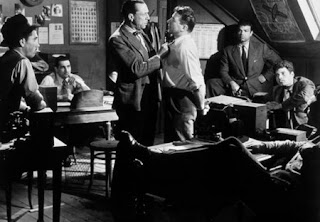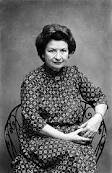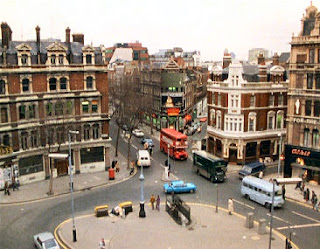I spy
As part of the To Be Read challenge I finally got round to reading Len Deighton's The Ipcress file. I've watched the iconic film loads of time - full of Sixties chic with a standout performance from Michael Caine. The film was a sort of riposte to the James Bond film canon, which was then firmly established after Dr. No, From Russia with love, and Goldfinger.
The Ipcress File was more firmly rooted in reality. No smart gadgets, no flashy cars, down to earth heroines, and a rather more believable storyline. Ironically though both Ipcress File film and the James Bond adventures involved many of the same team. Harry Saltzman produced both the Sean Connery Bonds and Ipcress File, while John Barry wrote the scores (a very chilly Cold War one for Ipcress File), and Ken Adam was responsible for production design.
The Ipcress File was more firmly rooted in reality. No smart gadgets, no flashy cars, down to earth heroines, and a rather more believable storyline. Ironically though both Ipcress File film and the James Bond adventures involved many of the same team. Harry Saltzman produced both the Sean Connery Bonds and Ipcress File, while John Barry wrote the scores (a very chilly Cold War one for Ipcress File), and Ken Adam was responsible for production design.
So I thought I knew what I was going to get when I started to read the original novel. But actually the film, although staying faithful to the book in some ways, is a very different animal. For a start the hero, Harry Palmer, is not called Harry Palmer in the book. The name Harry is mentioned once but is swiftly revealed to be an alias, and he's not the chirpy Cockney portrayed by Michael Caine, but a chirpy Northerner instead.
The book centres around an unnamed member of British Intelligence, who spends some time investigating the mysterious movements of British intelligensia. While on a trip to a Pacific atoll to watch the Americans test their latest neutron bomb, our hero discovers that there is a traitor working somewhere in his department. He would like it to be his former boss, Ross, who he dislikes, but suspicion falls upon his current boss, Dalby. Meanwhile the Americans have also begun to believe that British intelligence post-Burgess and Maclean is as leaky as an old sieve, but they suspect our hero, who is captured by US intelligence and tortured before (apparently) being turned over to the Hungarians....
Deighton's writing style is a sort of cross between John Le Carre and Raymond Chandler, but is also recognisably a very individual voice. A much better writer than Ian Fleming, and although there is plenty of violence in the novel, it doesn't have that sadistic edge that you get with Fleming.
Unlike the film the novel darts around geographically every bit as much as the Bond series, moving from London and the Home Counties to an exotic Pacific location, and the Lebanon. This proves to be surprisingly prescient. I assumed that the Beirut scenes were included because of the then recent defection of Kim Philby; and was astonished to discover that Philby defected AFTER the publication of Ipcress File.
There are some wonderfully witty lines, and some great characters. As a spy story it works well, even if it has some of the same failings as Bond (I found the general premise of the story very hard to believe). It's overly complicated, and I was left feeling rather confused by the ending; but I would happily read another Deighton again. As Max Hastings said of Len Deighton "To those of us who were in our twenties in the 1960s, his books seemed the coolest, funkiest, most sophisticated things we'd ever read". Ipcress file may not be the most realistic novel you'll ever read, but cool and funky it certainly is.











Comments